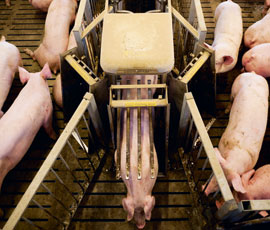Vaccine improves pig finishing times

Vaccinating pigs against porcine circovirus type 2 (PCV2) – one of the key causes of postweaning multisystemic wasting syndrome (PMWS) – improves finishing times and reduces pig mortality rates.
Pig vet Frank Tobin carried out a study on two batches of stock from David Otterburn’s 350-sow farrow-to-finish-unit at Linton on Ouse, Yorkshire.
One batch of 98 pigs was treated with an EP (enzootic pneumonia) and a PRRS MLV (porcine reproductive and respiratory syndrome) vaccine, while the other batch of 117 pigs was treated with an EP and a Circovac PCV2 vaccine.
Post-trial, the batch vaccinated with the PCV2 vaccine weighed on average 4.46kg more than the other group, taking on average 12 days less to finish.
In addition, the mortality rate from weaning to slaughter of the PCV2 vaccinated batch was 11.3%, compared with 31.25% in the other batch – a reduction of 64%.
“Porcine circovirus associated diseases (PCVD) is responsible for huge losses to the pig industry, and the PCV2 strain also predisposes pigs to other conditions, or aggravates conditions they may already have,” said Mr Tobin.
“This study demonstrated that, even in a herd under high disease pressure, using PCV2 vaccination in piglets can make a real difference to mortality and finishing times and weight.”
Farmer David Otterburn said: “It has been extremely beneficial and we have also seen other diseases suppressed – the pigs are a lot healthier.”
Merial Animal Health vet adviser Ricardo Neto said: “Previous research has shown that whether you vaccinate sows, piglets or both sows and piglets, some of the benefits of PCV2 vaccination are reduced mortality and improved performance resulting in reduced finishing times.
“However, the outcome of this study was outstanding, particularly given the general circumstances of the herd. Any reduction in mortality and finishing times is attractive to producers, let alone reductions of this magnitude.”
